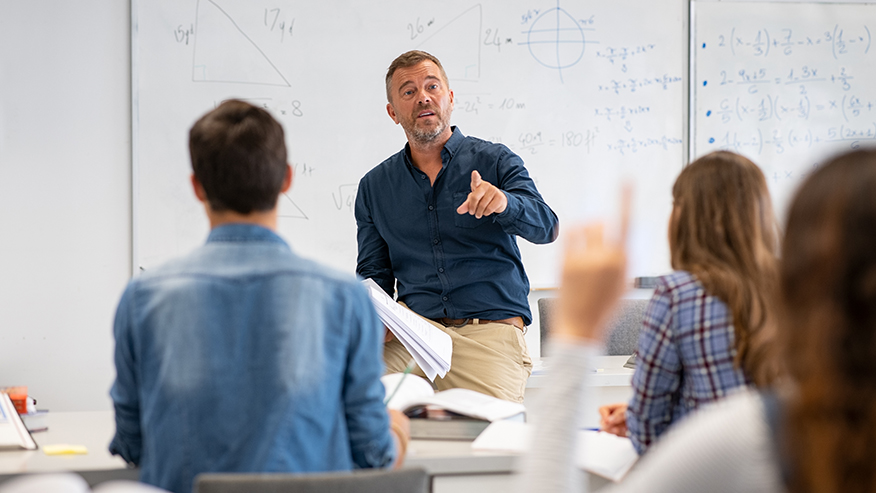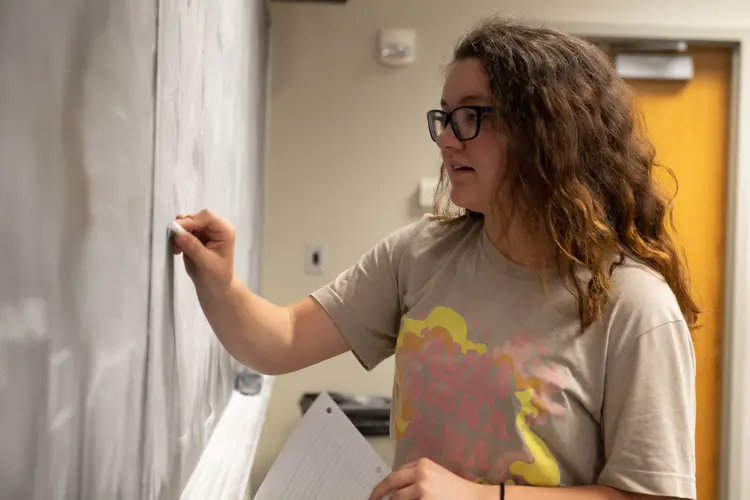All Concerning Qualified Math Teachers: Their Function in Fostering Student Growth and Achievement in Math Education
Certified math instructors are necessary in shaping pupils' understanding and recognition of maths. Their deep expertise and efficient teaching approaches can substantially influence trainee end results. These instructors not just pass on mathematical abilities yet also foster an inclusive setting that fulfills varied learning requirements. As they take on ingenious methods, the concern occurs: how do these techniques particularly enhance student engagement and achievement in math?
The Importance of Competent Mathematics Educators in Education And Learning
Although numerous factors contribute to student success in maths, the presence of certified mathematics instructors stands apart as a vital element in cultivating effective learning settings. Study continually shows that pupils taught by teachers with strong mathematical backgrounds tend to show higher degrees of understanding and accomplishment. Certified math teachers not just have a deep understanding of mathematical ideas however also the pedagogical abilities essential to convey intricate concepts in easily accessible means. They can identify students' individual demands and adapt their training strategies accordingly, promoting inclusivity and involvement. On top of that, their competence enables them to create a favorable classroom environment that encourages risk-taking and resilience in problem-solving. This supportive setting promotes a growth mindset amongst pupils, boosting their confidence and inspiration in mathematics. In general, qualified math teachers play an essential role fit trainees' perspectives towards math, eventually influencing their academic trajectories and future chances.
Secret High Qualities of Effective Math Educators
Efficient mathematics instructors have numerous key top qualities that enhance their training performance. These consist of deep subject expertise, strong interaction abilities, and flexible mentor strategies that cater to varied learning needs. Acknowledging and growing these attributes can greatly impact student understanding and interaction in mathematics.
Deep Topic Expertise
While a strong pedagogical method is essential, deep subject knowledge stays a keystone of effective mathematics educators. Such expertise makes it possible for teachers to understand mathematical concepts thoroughly and to expect pupil mistaken beliefs. Educators with a strong grasp of mathematics not only provide content with confidence but additionally connect different subjects, cultivating a richer knowing atmosphere. They are outfitted to apply diverse mentor strategies that satisfy various learning designs, making intricate concepts much more easily accessible. Deep subject expertise encourages teachers to engage in purposeful conversations with students, urging vital reasoning and analytical skills. Inevitably, the deepness of recognizing that mathematics instructors have substantially influences trainees' scholastic development and accomplishment in maths, laying a strong structure for future understanding.

Solid Interaction Skills
Deep subject expertise alone wants for promoting a productive learning atmosphere in mathematics; solid interaction abilities are similarly necessary for reliable mathematics teachers. These skills make it possible for teachers to share complicated concepts in easily accessible means, making sure that trainees realize fundamental ideas. Reliable communication involves not just clarity yet also the capability to actively listen, encouraging trainee engagement and addressing misconceptions. By promoting an open discussion, teachers develop a helpful class atmosphere where trainees feel comfy asking inquiries and sharing their ideas. Furthermore, solid communicators can adapt their language and descriptions to fit varied understanding designs, improving pupil involvement and comprehension. Inevitably, effective interaction bridges the void between an educator's understanding and a student's understanding, considerably affecting academic achievement in mathematics.
Adaptive Mentor Approaches
A selection of adaptive teaching methods are crucial for effective math teachers intending to satisfy the varied demands of their students. These methods enable instructors to tailor their instruction based upon specific knowing passions, abilities, and designs. qualified math teachers. Methods such as separated guideline, where instructors change web content, procedure, or item, assistance address varying proficiency levels. In addition, including technology and interactive devices can enhance interaction and promote individualized learning experiences. Developmental analyses allow teachers to monitor progress and change training techniques appropriately. Collective group work advertises peer understanding, cultivating a supportive environment. By employing these adaptive methods, math educators can produce comprehensive classrooms that motivate all pupils to flourish and attain their academic objectives, inevitably fostering a love for maths
Innovative Training Approaches Used by Math Educators
As teachers look for to engage trainees more properly, cutting-edge teaching approaches have become a focal factor in mathematics class. These strategies intend to boost understanding and retention of mathematical principles. One popular technique is making use of innovation, such as interactive software application and online simulations, which allows students to envision complicated troubles and obtain prompt feedback.Additionally, project-based discovering encourages cooperation and real-world application of math concepts, fostering critical believing abilities. Gamification, where math principles are integrated into game-like atmospheres, has actually also acquired appeal, making finding out more pleasurable and inspiring for students.Moreover, distinguished direction click for info dressmakers lessons to accommodate varying ability degrees, ensuring that all trainees can advance at their own speed. By utilizing these innovative approaches, mathematics instructors produce dynamic discovering experiences, ultimately promoting better student development and success in mathematics.
Creating Inclusive Discovering Settings
Creating inclusive knowing settings in mathematics education entails applying varied discovering approaches and cultivating collaborative group activities. These methods satisfy the different demands of pupils, ensuring that everyone has the opportunity to involve and prosper. By focusing on inclusivity, math teachers can grow a classroom ambience that supports all learners.
Varied Discovering Methods
While numerous educators undertaking to promote comprehensive learning environments, carrying out diverse understanding techniques is crucial for efficiently reaching all students. These techniques incorporate a series of mentor approaches tailored to fit varying discovering capacities, backgrounds, and designs. For example, including visual aids, manipulatives, and modern technology can engage students who might fight with conventional direction. In addition, separated guideline allows teachers to customize analyses and assignments, making sure that every pupil can access the educational program at their very own degree. Culturally responsive pedagogy additionally plays a significant go to website function in identifying and valuing the varied experiences of trainees, thus enhancing their connection to the product. By using these diverse understanding strategies, qualified mathematics teachers can create a helpful ambience where all pupils are empowered to do well in maths.
Collaborative Group Activities

The Influence of Professional Mathematics Educators on Trainee Success
The visibility of certified mathematics instructors substantially affects trainee achievement, as efficient direction can bridge spaces in understanding and foster a positive learning setting. Study shows that students taught by skilled teachers demonstrate greater levels of effectiveness in mathematical concepts compared to their peers. Certified math educators have a deep understanding of mathematical material, allowing them to existing product in varied manner ins which accommodate various finding out styles. This adaptability not only boosts comprehension yet likewise boosts student self-confidence in their abilities.Moreover, qualified instructors commonly use formative evaluations to keep track of student development, enabling for timely treatments when necessary. Their capability to produce engaging lessons motivates pupil involvement and advertises a growth mindset. Because of this, the impact of qualified mathematics educators extends beyond plain scholastic performance; it grows a feeling of inquisitiveness and resilience in students, eventually bring about boosted results our website in mathematics and a stronger structure for future understanding.
Methods for Engaging Trainees in Mathematics
Engaging trainees in mathematics requires a complex technique that integrates varied techniques to capture their passion and enhance understanding. One reliable method is the usage of real-world applications, enabling students to see the relevance of mathematical ideas in daily life. Integrating technology, such as interactive software and on the internet resources, can also promote involvement by giving vibrant discovering experiences.Group job urges cooperation, enabling pupils to pick up from each other and establish problem-solving skills in a helpful atmosphere. In addition, integrating games and hands-on activities can make discovering more satisfying and accessible.Differentiated direction satisfies various learning styles, guaranteeing that all students can get in touch with the product. Ultimately, giving prompt comments aids pupils recognize their progress and locations for improvement, cultivating a development mindset. By employing these strategies, teachers can develop an engaging mathematics classroom that advertises student development and success.
The Function of Specialist Advancement in Enhancing Mathematics Training Abilities
While several teachers recognize the relevance of efficient mentor techniques, specialist growth plays a crucial function in improving math teaching abilities (qualified math teachers). Continual training opportunities permit educators to remain current with instructional improvements, mathematical web content, and technical devices. Workshops and workshops provide forums for educators to collaborate, share ideal practices, and go over difficulties they experience in the classroom.Furthermore, specialist growth cultivates a development attitude amongst educators, encouraging them to assess their techniques and adapt their techniques based upon pupil needs. This continuous understanding process not only boosts teachers' mathematical understanding however likewise outfits them with innovative training techniques that can result in boosted student engagement and achievement.Ultimately, a structured expert growth program can greatly impact the quality of math education, ensuring that teachers are well-prepared to inspire and direct their students towards success in mathematics
Regularly Asked Questions
What Certifications Are Essential to Become a Math Teacher?
To become a mathematics educator, people normally need a bachelor's level in maths or education and learning, mentor certification, and a strong understanding of mathematical concepts. Extra qualifications might consist of specialized training in pedagogy and class administration skills.

Exactly How Do Mathematics Teachers Assess Trainee Progression in the Classroom?
Math educators analyze student progress through different approaches, consisting of examinations, projects, and tests (qualified math teachers). They also use empirical analyses and pupil engagement to gauge understanding, readjusting instruction based upon private and team performance to boost learning end results
What Challenges Do Mathematics Educators Frequently Face?
Math instructors frequently deal with challenges such as differing student skill degrees, limited sources, educational program restrictions, and the need to involve pupils successfully. Additionally, they typically run into stress to improve standard examination ratings and take care of class habits.
Exactly How Can Parents Assistance Their Youngster's Math Education?
Parents can support their kid's math education and learning by supplying a favorable discovering atmosphere, participating in math-related activities, urging a favorable perspective towards obstacles, and preserving open communication with educators to keep an eye on development and address problems.
What Resources Are Available for Math Educators to Improve Their Skills?
Different resources are readily available for math instructors, including on the internet courses, expert growth workshops, peer collaboration teams, instructional internet sites, and teaching journals. These tools boost educational strategies, deepen subject knowledge, and eventually boost student discovering outcomes in maths. Certified mathematics teachers are essential in forming pupils' understanding and appreciation of mathematics. Lots of factors contribute to trainee success in mathematics, the existence of certified mathematics teachers stands out as a critical component in cultivating reliable understanding environments. In addition, qualified mathematics educators promote these interactions by tactically grouping students, guaranteeing that each group consists of a mix of skill degrees and backgrounds. The visibility of qualified mathematics instructors substantially influences student achievement, as reliable instruction can link voids in understanding and cultivate a positive understanding setting. Mathematics instructors typically deal with challenges such as differing trainee ability levels, minimal sources, curriculum restrictions, and the need to involve trainees efficiently.
Comments on “The evolution of math instruction led by qualified math teachers”